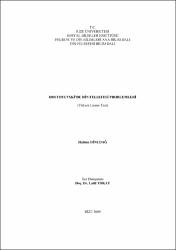| dc.description.abstract | Din felsefesinin temel sorunlarının edebi eserlerde ele alınması, ifade şekillerinin çeşitliliğini gösterir. Dostoyevski de felsefi sorunlarını romanları aracılığıyla ele almaktadır. 19. yüzyılın vazgeçilmez sorunlarından olan Tanrı'nın varlığı, kötülük, özgürlük,ölümsüzlük gibi din felsefesini ilgilendiren konular, Dostyoyevski tarafından romanlarında yoğun bir şekilde işlenmiştir. İzlediği metot, paradoksal ve antinomiler şeklinde olmuştur. Bu çalışmada da konuların hangi yönlerinin ve nasıl ele alındığı incelenerek Dostoyevski'nin tutumu ortaya konulmuştur. Dostoyevski özellikleTanrı'nn varlığı ve insanın evrendeki konumundan yola çıkarak ne tür tipolojilerin oluştuğunu ortaya koymuştur. İnsanın dünya görüşünü belirlemesinde Tanrı asli unsurdur. Tanrı'ya imanla ya da O'nu inkarlakişinin kötülük, özgürlük, ahlak anlayışları şekillenir. ancak mutlak manada iman ve inkardan bahsetmek mümkün değildir. Bu yüzden iman paradoksal bir tutum olmaktadır. İnsan, aynı anda hem Tanrı'ya doğru bir eğilim gösteren hem de onu inkara giden düalist bir yapıya sahiptir. Dostoyevski'nin konumu da bu bağlamda değerlendirildiğinde iman ile inançsızlık arasında bir yerde durmaktadır. Bu konuda kesin bir yargıya varmak mümkün değildir. This dissertation's aim is to analyse the problems of philosophy of religion in Dostoevsky's thought. Dostoevsky, regarded as one of the world's greatest thinkers, explain about whether or not Dostoevsky defenced certain religious issues. Because, he discussed religious topics as antinomies. His novels deal with especially god-human relationship. But we cannot certainly say that whether or not Dostoevsky believes in God. Dostoevsky rejected materialist definitions of humanity. He insisted on human unpredictability. For Dostoevsky, absolute human freedom is impossible in the world. So, if human want to be free he must kill God. Killing God, human cannot declare his freedom. Also he must kill oneself. If God is dead then what can human do? For Dostoevsky, if God is dead then all is permitted. This situation will lead to reduced crime. on the other hand, if there is a God then why there is evil in the world? Belief is contextual and ideal. As a result we can say that Dostoevsky is the line between belief and nonbelief. | en_US |


















